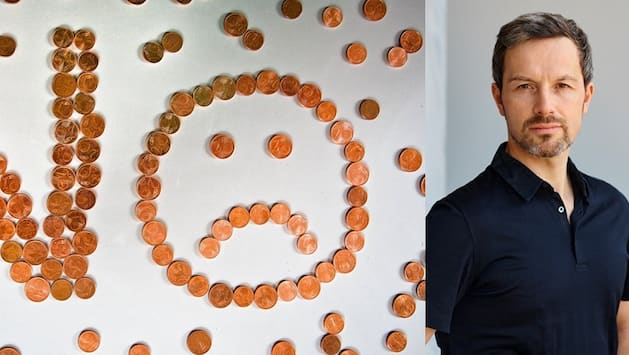There has been a fight against cash for years. Of course, combined with the hint that one is pursuing higher and honorable goals such as money laundering, crime and tax evasion. In truth, Orwellian surveillance threatens.
Little by little, this salami tactic is used to rob us of our cash and take it away at the same time – often unnoticed by the general public. Or did you know that our federal government has been investing millions of tax dollars in cash abolition for years? Yes, I was stunned too when I researched this.
But first things first: In 2019, the 500 euro note was shelved to stop money laundering and tax evasion. The hoped-for success did not materialize and to date no empirical evidence of containment has been found. Even the Bundesbank had to admit that this action was a sentence with an x - since then only 20 percent of the notes in circulation have been returned.
At the same time, the amount for the anonymous over-the-counter transaction (acquisition of precious metals, precious stones, etc. without registration) was reduced from 15,000 euros to 2,000 euros within just two years. I think it’s only a matter of time before this window closes completely.
The next attack took place during the Corona crisis: In the beginning, cash was considered dangerous for a while because it was defamed as a virus carrier, which of course was absolute nonsense. Nevertheless, we still see stickers today that advertise secure contactless payment.
But that’s not all: in December, Brussels agreed on an EU-wide upper cash limit of 10,000 euros. If German Interior Minister Nancy Faeser had had his way, a cash limit of well under 1,000 euros would have been implemented. Here, too, the Deutsche Bundesbank is driving the EU and the federal government into the parade with a clear contradiction:
“So far there is no scientifically based evidence that the goal of combating money laundering is achieved with cash payment limits.” This has also been shown by experience in countries where payments with notes and coins are already limited to certain sums. “I therefore think that an upper limit for cash payments is a mistake,” said Johannes Beermann, a member of the Deutsche Bundesbank’s Board of Management.
At the same time, under the guise of the Sanctions Enforcement Act (this is intended to make life difficult for Russian oligarchs and, as always, to fight money laundering), the German federal government has taken all citizens into kin custody. Because the new paragraph 16a in the Money Laundering Act (GWG) prohibits paying for real estate, land, houses and apartments in cash, gold or cryptocurrencies.
As you can see, cash is being attacked on many fronts. And if cash were abolished, it would have a number of disadvantages for us citizens.
Only about two percent of the money supply is in notes and coins as cash. Or to put it another way: only every fiftieth euro. If only 5 or 10 percent of Europeans took out their money from the bank, the house of cards would collapse and most would be left without money. Cashless payment is becoming increasingly popular in times of credit cards, Apple Pay, PayPal and the like. Over 90 percent of all payments are made with EC and credit cards or bank transfers/direct debits. In fact, we already have a digital euro. So why is the ECB pushing so hard to introduce a digital euro in the form of a CBDC (Central Bank Digital Currency) for the Eurosystem?
All transfers and transactions, whether private or commercial, are collected by the banks and carried out once a day in the banking system between the institutes. At the moment, only the banks can see what customers are spending their money on. A transfer of transactions to the ECB or other parties is not possible and prohibited for a number of reasons. With a CBDC, this problem would be permanently solved. Then every citizen in the EU would have a digital account (wallet) directly with the ECB – and the ECB would have a complete overview in real time.
Of course, the central banks will pull out all the stops with charm to make this brave new world palatable for us: Payments will then be safe, practical, hygienic, contactless, more efficient, cheaper and faster.
The price for this would be high, however, because every customer and every transaction would then be completely transparent and traceable. A digital currency can provide countless data about payment flows and user behavior of citizens. You could conveniently link the wallets with, for example, the vaccination certificate and other data. And then we have the truly transparent clientele.
Let’s think provocatively: In order to save the climate and educate us to be better people, you could also install a Co2 credit account. Anyone who then uses up their CO2 balance because they travel or drive a car too much, eat meat instead of beetles or highly processed meat substitutes, has to pay or even starve. This is the intelligence agency’s wet dream and nightmare that George Orwell warned us about.
Another risk: In addition to Orwellian surveillance, interest rates could easily be reduced to negative territory without citizens being able to withdraw money from the bank and escape the negative interest rate. A bank run would be impossible in the future.
Penalty interest or a wealth levy could be used quickly and efficiently and withdrawn from every account with no one to defend against. The same applies to traffic tickets, the broadcasting fee, etc. How practical! The centralized ECB could even freeze the account at any time. Just like now with the great role model China.
Speaking of China: as the icing on the cake, you could also install a social credit program. A centrally controlled digital money, paired with the social credit system, is the perfect (and perfidious) solution to keep your own citizens in check, to control them at all times and to punish them if they don’t follow the rules. If you then step out of line, in addition to the deduction of social credit points, you will also receive sanctions in the form of withdrawal limits or account blocks. The digital dictatorship is ready under the mantle: climate neutrality, solidarity and justice.
But consumption could also be controlled. In China people are thinking about Schwundgeld. The credit expires after a certain time to stimulate the economy. On the other hand, payments could also be limited or even blocked for certain goods. Exactly as a centralized institution would like it to be.
Marc Friedrich is a six-time bestselling author, financial expert, sought-after speaker, pioneer, free spirit and founder of the fee-based consultancy Friedrich Vermögenssicherung GmbH for private individuals and companies. In 2021 he wrote the most successful business book of the year (advertisement). More information at https://friedrich-partner.de and on YouTube: https://www.youtube.com/MarcFriedrich7
The ECB wants to introduce the digital euro by 2024/25. All central banks around the world are working flat out on digital currencies because the advantages for them are obvious. Ultimately, a digital euro is nothing more than the unsecured fiat money system that is 100 percent digitized. It only has disadvantages for us citizens, because we can then be monitored and expropriated without any problems. Negative interest rates can be installed without us being able to protect ourselves from them. Because in such a case, the escape route is blocked, namely withdrawing cash, taking it out of the banking cycle and thus legally withdrawing it from surveillance and access by the states.
So you see why receiving cash is so important to anonymity, freedom and democracy.
But this freedom has been under attack from all sides for years. Not only the states and central banks are attacking cash, but also organizations such as the “Better Than Cash Alliance”, a global association of governments, companies and international organizations that want to accelerate the transition from cash payments to digital payment methods. Members are – unsurprisingly! – the credit card giants Visa and Mastercard, Citibank, but also the Bill and Melinda Gates Foundation. I find what I found in my research, which I mentioned at the beginning, very exciting: the anti-cash alliance received German tax money from our federal government. From 2016 to 2018 it was 500,000 euros and since 2019 it has been 200,000 euros annually.
The trend is clear: Cash is being phased out quietly and gradually. At the beginning of the year, Lufthansa announced that it would only accept cashless payments at its service points. Almost at the same time, the Gravis technology chain with its 40 branches announced that cash would no longer be accepted with immediate effect.
The fact is: only cash guarantees possession and ownership of one’s assets. Money in the account does not belong to you, it belongs to the bank. I have made several important videos for this. Cash is and remains printed freedom! It is and remains the only legal tender according to the statutes of the ECB: “The euro banknotes and coins are legal tender in the euro area. Cash is the only form of central bank money that we can all use directly.”
Even in the event of a blackout, cash will be the only official means of payment that will still work.
Despite my passionate plea for cash, I must also mention that our current monetary system is not sustainable. Because unsecured paper money (fiat money) will, as always in the course of history, continue to lose purchasing power and ultimately fail. Above all, the dysfunctional currency experiment, the euro. This is why an independent, decentralized, limitless, non-manipulable and deflationary system like Bitcoin is so ingenious and important. For me it is and remains the only alternative for a better monetary system.















